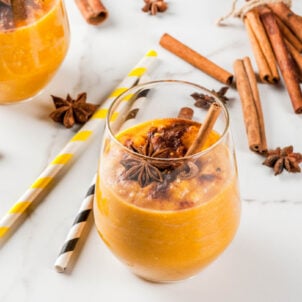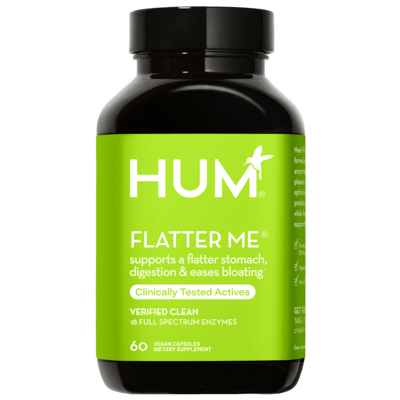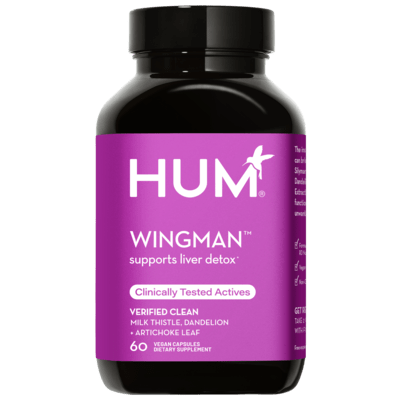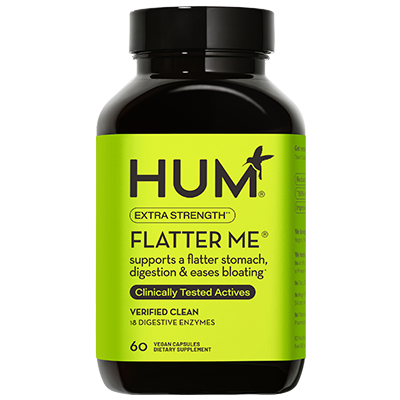Have you experienced bloating during the holidays year after year? Well, say goodbye to bloat as you indulge in your favorite holiday meals this season with HUM’s digestive enzymes from the Flatter Me family.
The holidays are a time for joy, family, and, of course, indulgent meals. But as decadent as a big holiday dinner can be, it often comes with an unpleasant side effect—bloating. Many choose to fast in anticipation of the meal, only to end up eating too much, too fast. And if you’re hopping from one gathering to the next, you may find yourself overeating without even realizing it. Fortunately, there are easy ways to fight post-meal bloat without having to give up the traditions you love, including a few of our products that take on bloating and digestion for relief. Let’s explore what causes holiday bloating and how you can enjoy your meals without regretting them later.

Understanding the Causes of Bloat
Bloating is a common digestive issue during the holidays, largely due to eating habits that disrupt the body’s normal digestive processes. According to naturopathic physician Alaa Gerais, NMD, bloating can last anywhere from two to four hours after a heavy meal and can indicate distress within the digestive process.
Disruptive eating habits that can strain the digestive system include:
- Different eating schedules: Skipping meals to “save room” for dinner can lead to overeating.
- Larger portions: Overindulging means more work for your digestive system, resulting in bloating.
- Heavy foods: Foods high in sodium, sugar, and fats cause bloating by holding water, slowing digestion, and disrupting gut bacteria.
- Alcohol and stress: Both increase stomach acid and can trigger digestive inflammation.
- Lying down after eating: This impairs digestion, causing food to sit in your stomach longer and produce gas.
While many factors can contribute to bloating, Here are three key ingredients to look out for
- Sodium
- Fat
- Sugar
A majority of holiday dishes contain at least one (if not all) of these three ingredients, and each causes bloating in its own way:
Sodium: When we consume too much sodium, the body works to maintain the balance of fluids. Sodium draws water into tissues, causing the body to hold onto excess water to dilute the sodium levels. This water retention can create swelling, especially in the abdominal area, contributing to that “full” or bloated sensation.
Fat: Fat takes longer to digest than other nutrients. When we eat fatty foods, the digestion process slows, giving the bacteria in the digestive tract more time to ferment food. This fermentation produces gas, which can get trapped in the stomach or intestines, causing bloating.
Sugar: Sugar can upset the balance of gut bacteria, leading to bloating. During digestion, the body often struggles to fully absorb sugars in the small intestine due to limited enzymes. As a result, undigested sugars move to the large intestine, where bacteria ferment them, producing gas. This gas buildup leads to bloating and may also trigger inflammation in the gut. (It’s important to note that even “healthy” foods like fruits, vegetables, and dairy products contain sugars that can cause bloating in sensitive individuals.
How Do Digestive Enzymes Work?
“Digestive enzymes are normally produced in the body to help break down the size of food and allow us to absorb the foods we eat,” Gerais explains. Then, digestive enzymes are “released from the saliva the moment you start to chew your food,” along with additional enzymes in the stomach, small intestine, and pancreas.
“For those of us who have a hard time digesting meals, meaning we feel bloated or full for hours after heavy meals,” Gerais recommends supplementing with digestive enzymes (like our Flatter Me supplement) before the big meal. This will help “aid in proper digestion and relieve discomfort,” she adds.
HUM’s Flatter Me supplement is designed to tackle holiday bloating head-on. With its blend of 18 digestive enzymes, this product helps break down holiday trigger foods, which can be hard on your digestive system, providing quick relief.
Key ingredients like ginger, peppermint, and fennel seed also help soothe the digestive tract, reduce gas, and aid nutrient absorption.
Incorporate Herbal Teas
Similar to Flatter Me, many herbal teas use the same digestion-friendly ingredients (ginger, peppermint, chamomile, and fennel seeds) for their bloating and gut-health benefits:
- Ginger: Reduces inflammation, stimulates digestive enzymes, and supports healthy digestion.
- Peppermint: Relaxes the digestive tract, alleviates gas, and reduces bloating and cramping.
- Fennel Seed: Relieves gas and encourages digestive movement, helping prevent constipation.
In addition to taking a Flatter Me supplement, sipping herbal teas with these ingredients after a big meal can make you feel more comfortable by reducing bloating and supporting digestion.
The Importance of Staying Hydrated
Staying hydrated is vital to preventing and relieving holiday bloating by supporting digestion at every stage. Saliva, which is 99% water, moistens food and introduces digestive enzymes to break it down from the first bite. Healthy hydration levels ensure food moves smoothly through the digestive tract, preventing slow digestion and constipation—both of which can cause bloating. Hydration also helps flush out toxins and excess sodium, reducing inflammation and water retention in the body. Think of water as a lubricant that keeps your digestive system running efficiently, from first bite to waste removal.

Tips for Drinking More Water
- Consistently drink water throughout the day: It’s important to drink water continuously throughout the day, but don’t gulp water too quickly, as this can cause you to swallow air, which can cause bloating.
- Drink water before meals: Drinking more water before meals can help prevent overeating (potentially leading to bloating) and prepare the digestive system for incoming food. Gerais recommends drinking 16-32 oz of water 45-30 minutes before a meal. “Water helps lubricate our digestive tract, making it easy for food to pass,” she says. But be aware that drinking too much water right before a meal can also distend the stomach, making you feel bloated or full.
- Limit water intake right after meals: It’s okay to sip on water during or immediately after a meal, but drinking too much can dilute the digestive enzymes, slowing the digestive process. This can then increase the feeling of bloating or “fullness,” causing even more discomfort.
Walk It Out to Reduce Bloating
A light walk after meals can work wonders for bloating by stimulating digestion and preventing gas buildup. Walking encourages food to move through your digestive tract more efficiently, preventing constipation and discomfort. It can also prevent you from feeling sluggish, especially after a big, heavy meal.
How Long Should I Walk?
After a large, heavy meal, the last thing most of us want to do is be active, but it’s actually the best thing we can do for our bodies. Taking a stroll right after eating can manage your blood sugar levels, promote healthy digestion, and reduce bloating. However long you choose to walk is up to you. Even 10 minutes of walking at a light pace can provide digestion relief, though some may prefer to walk for 30 minutes, which can also benefit weight loss. Whatever you choose, just remember to keep the pace light to avoid discomfort.
Limit Carbonated Drinks and Alcohol to Reduce Bloating
Carbonated beverages and alcohol are common culprits of holiday bloating and, depending on the drink, can easily sneak up on you. Carbonated beverages contain carbon dioxide, and when consumed, the gas can become trapped in the stomach, creating pressure and causing you to bloat. While some of the gas is released through belching, the rest is absorbed into the bloodstream and eliminated through breathing. However, sweeteners in these drinks—whether sugar or artificial alternatives—can further contribute to bloating by disrupting digestion and promoting gas buildup.
Alcohol can also slow digestion and cause water retention, compounding the bloating effect. Together, these beverages can leave you feeling uncomfortably full, especially during heavy meals.
How Alcohol Can Trigger Bloating
- Diuretic effect: Alcohol increases urination, leading to water retention.
- Inflammation: Alcohol can irritate the stomach lining and digestive tract.
- Slows digestion: Alcohol slows digestion by decreasing the number of digestive enzymes and creating gas buildup.
- Carbon dioxide: Beverages like beer, champagne, and seltzers contain carbonation that can trap gas.
- Fermentation: Beer contains gluten, which may cause bloating for those with sensitivities.
Tips to Reduce Bloating from Drinks
To reduce bloating from drinks, opt for lower-bloating options like vodka, gin, or tequila. If you enjoy fizzy drinks but could do without the bloat, try cutting them with juice, teas, or other (non-bloating) mixers to minimize gas intake. However, if you find yourself easily bloating, you might consider sticking to low-alcohol or avoiding carbonated beverages altogether. For a refreshing, digestive-friendly alternative, you can make infused water with anti-bloating ingredients like ginger, lemon, and cucumber.
Mindful Eating and Portion Control
It’s easy to lose control during holiday get-togethers, but sticking with a few of these mindful eating tips can help reduce bloating:
Use smaller plates. Start by using smaller plates to control portions. This creates the illusion of a fuller plate, making meals feel more satisfying without overeating. Even if you can’t resist trying every dish on the dinner table, a smaller plate will keep your portions in check.
Eat slowly. When we eat, it takes about 20 minutes for the stomach to send the “full” signal to the brain. However, distracted eating and eating quickly cause many to overeat and become bloated. Taking the time to eat and chew slowly (which helps with food breakdown) can prevent overeating and avoid discomfort.
Listen to your body’s cues. Like eating slowly, it’s essential to be aware of what your body is feeling. Emotions like boredom, stress, or even thirst can often be mistaken for hunger, so always make sure that you’re not experiencing other emotions or feelings that may be masked by hunger and reaching for food as a go-to.
Avoid skipping meals. Many skip meals in anticipation of diving into a big holiday meal later in the day. Doing so can lead to overeating later on, causing bloating and discomfort. Instead, stick to small, balanced meals or try some of these bloat-free snacks to maintain optimal digestive health.
Flatter Me: The Holiday’s Solution to a Bloat-Free Tummy
Flatter Me uses a variety of 18 digestive enzymes to help break down key nutrients—such as proteins, carbs, fats, sugar, and lactose—making it easier for your body to absorb them while minimizing any bloating and discomfort. Additional ingredients like ginger, peppermint, and fennel seed reduce gas and other pressure that may cause discomfort while your body works to digest the food.
If you’re still experiencing bloating despite using the supplement, consider one of Flatter Me’s other options:
Flatter Me Plus: Flatter Me Plus uses the original formula and adds pre- and probiotics to help the body digest foods and promote regular bowel movements. This option is great for those who are struggling with digestion overall, causing bloating and chronic constipation.
Flatter Me Extra Strength: Flatter Me Extra Strength adds 50% more digestive enzymes to the original formula for those who need an extra boost in their digestive process. It’s ideal for individuals with slower digestion or an age-related enzyme reduction.
How to Take Flatter Me
For best results, take one Flatter Me capsule twice daily before eating your (biggest) meal. Taking the supplement before meals helps prepare your digestive system for large or heavy meals, making it the perfect solution during the holidays (or any other time you’re feeling bloated). The enzymes in the formula start working immediately, breaking down food to prevent gas and discomfort. Regardless of the product you choose, all of the Flatter Me supplements will provide digestive support and relief from bloating.
While holiday meals are meant to be enjoyed, they often lead to uncomfortable bloating due to overindulgence and disruptive eating patterns. But there are plenty of ways to reduce bloating and enjoy your favorite foods guilt-free. Maintaining proper hydration, light exercise, and using supplements like Flatter Me can help you break down heavy meals and improve your digestion. Additionally, practicing mindful eating and portion control can help you avoid the post-dinner bloat altogether. With these strategies, you can indulge in holiday treats without the discomfort.
The Takeaway: Bye, Bloat!
Say goodbye to post-meal discomfort and bloating with this powerful digestive enzyme supplement. Flatter Me helps your body break down proteins, fats, fibers, and more for smoother digestion and better nutrient absorption. Whether you’re indulging in holiday treats or enjoying everyday meals, Flatter Me is your go-to for a flat tummy with more comfort. Get ahead of the bloat and try Flatter Me today!
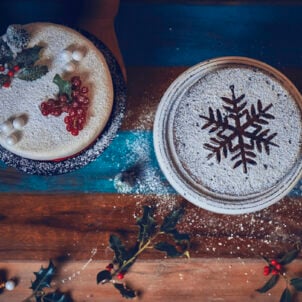
7 Tips to Enjoy Your Favorite Holiday Foods, Sans Guilt and Weight Gain

Boost GLP-1 Naturally Through Diet, And Why Protein is Paramount
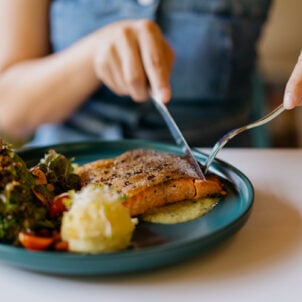
How Much Protein Do You Need Daily? An RD Weighs In with Nutrition Tips and Recipes
